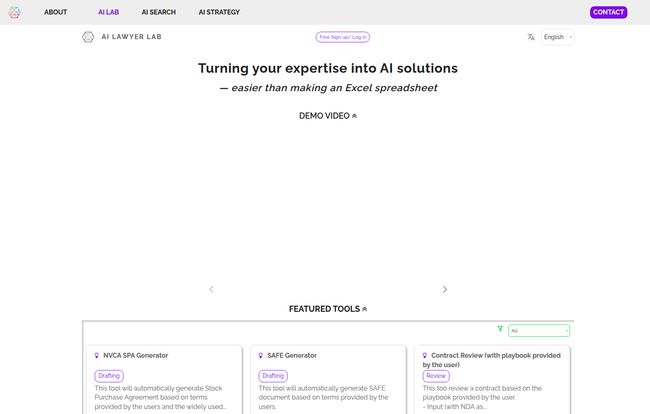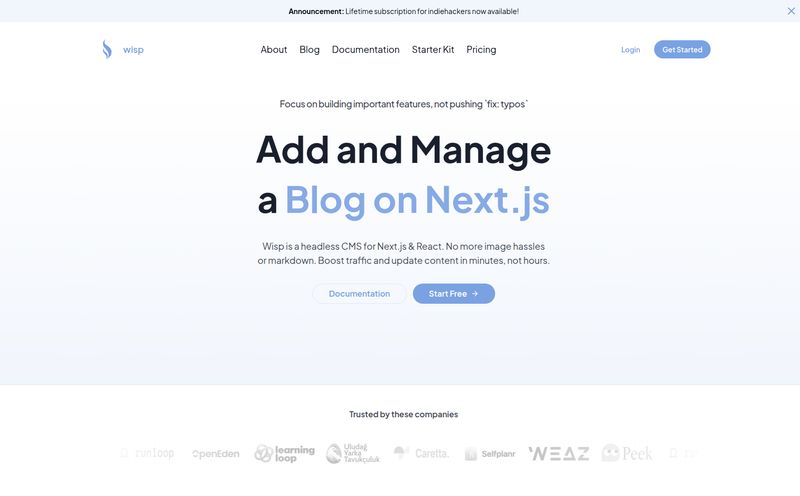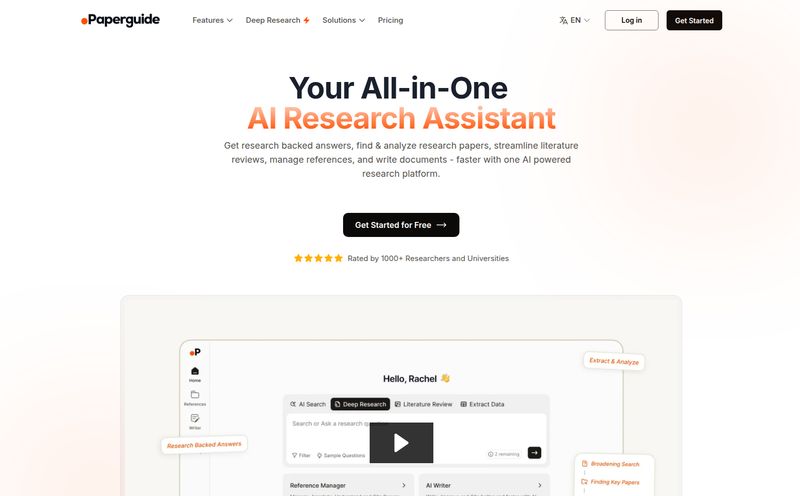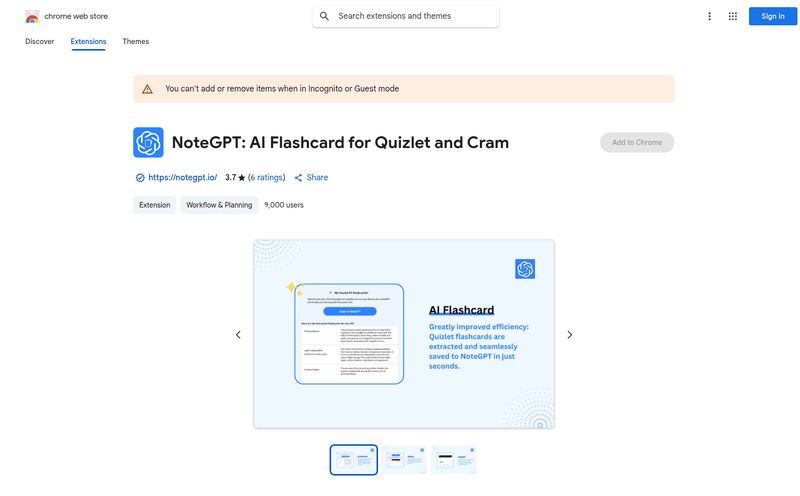I've been in the digital marketing and SEO game for years, and if there's one thing I've seen over and over, it's the hype cycle. A new technology bursts onto the scene, and suddenly it's going to “revolutionize” everything. Remember the early days of social media for businesses? Or the VR craze? Yeah. The legal world has been particularly susceptible to this, with wave after wave of 'game-changing' tech that often ends up being clunky, overpriced, or just… not that helpful.
So, when I first heard about AI Lawyer Lab, my professional skepticism kicked in immediately. Another platform promising to bring AI to the legal field? Groundbreaking. But then I looked closer, and my tune started to change. This one feels different. It isn’t just another chatbot with a law degree filter slapped on it. It’s something else entirely—a workshop for building your own AI tools, without needing to write a single line of code. And honestly, I'm pretty intrigued.
What on Earth is AI Lawyer Lab, Anyway?
Let's cut through the jargon. At its heart, AI Lawyer Lab is a no-code innovation lab for legal professionals. The key phrase there is “for legal professionals.” It was created by lawyers, for lawyers and that pedigree shows. The entire platform is built around a single, powerful idea: your legal expertise is incredibly valuable. What if you could pour that expertise directly into a custom-built AI application that could automate tedious tasks, assist with research, or even draft initial documents based on your specific methods?
Think of it less like buying off-the-shelf software and more like getting a custom-built set of power tools. You know how to do the work, you have the knowledge; AI Lawyer Lab just gives you the machinery to do it faster, more consistently, and at scale. It’s all about a concept they call “expertise engineering”—the process of turning your professional knowledge into a functional, automated system.
More Than a Prompt Window: A Look Under the Hood
This is where things get really interesting. When you pop open the hood on AI Lawyer Lab, you don't just see a simple text box like in ChatGPT. You see an entire control panel. It’s a builder's paradise.

Visit AI Lawyer Lab
From what I've seen, creating a new tool is a structured process. You give your tool a name (like “Lease Clause Red Flag Finder”), define what kind of input it needs (maybe the user uploads a PDF of the lease), and what kind of output you want. But the real magic is in the “Instruction” section. This is where you, the legal expert, become the AI trainer.
You can provide:
- General Instructions: You set the persona. Something like, “You are an experienced commercial real estate lawyer reviewing a lease for a small business owner.”
- Method: This is your secret sauce. You can provide a step-by-step process for the AI to follow. “First, scan the document for indemnity clauses. Second, compare them against our standard clause library. Third, flag any deviations and explain the potential risk in simple terms.”
- Knowledge: This is a big one. You can upload a PDF—maybe your firm’s internal guide on best practices, a key piece of legislation, or a set of case precedents. The AI will then use that specific document as its source of truth, preventing it from just pulling vague information from the internet.
You even have control over which AI model powers your tool, with options like OpenAI’s GPT-4o or Anthropic’s Claude 3 Opus. This level of control is what separates a professional tool from a consumer toy. It's the difference between a finely tuned racing engine and a lawnmower motor.
The Good, The Bad, and The AI-Powered
No tool is perfect, and as an SEO and trends analyst, I’ve learned to look at things with a critical eye. So let's get into the nitty-gritty. What do I genuinely like, and what gives me pause?
The Upside: Why I'm Genuinely Excited
The biggest pro, by a country mile, is empowerment. For years, lawyers have been at the mercy of what tech companies think they need. This flips the script. It puts the power to innovate directly into the hands of the people who actually do the work. A paralegal could design a tool to automate discovery requests. A senior partner could build an assistant that drafts client intake summaries in their specific style. The potential for creating truly bespoke, useful tools is immense.
It also addresses the massive inefficiency in the legal field. The amount of time wasted on repetitive, formulaic tasks is staggering. Tools like teh ones you can build here—like a SAFE Generator for startups or a Closing Checklist Drafter for M&A deals—can claw back hundreds of hours. That’s more time for high-level strategy, client relations, and, let's be honest, a better work-life balance.
A Dose of Reality: The Potential Hurdles
Now, let's be real for a second. This isn't a magic wand. The effectiveness of any tool you build is directly proportional to the quality of your input. Garbage in, garbage out, as they say. If your instructions are vague or your uploaded knowledge is flawed, your AI tool will be, too. It requires a new way of thinking—you have to be able to break down your expertise into a logical, step-by-step process. Some might find this initial learning curve a bit steep.
There's also the reliance on third-party AI models. While having access to powerhouses like GPT-4 is great, it also means you're subject to their limitations, biases, and any potential data privacy concerns. For firms handling highly sensitive information, this is a critical point to consider and one that requires careful due diligence. You are, in essence, trusting another company's black box with your workflow.
Let's Talk Money: The AI Lawyer Lab Pricing Question
Okay, the million-dollar question: what does it cost? The short answer is, I couldn't find a clear pricing page. This isn't uncommon for specialized, B2B SaaS platforms like this one. Often, pricing is customized based on the size of the firm, the number of users, and the level of support required. They likely want to have a conversation with potential clients to understand their needs before throwing out a number.
My advice? If you're serious, don't let the lack of a public price tag scare you off. Reach out to them through their website. A demo is probably the best way to see if the value proposition holds up for your specific use case. It's an investment in efficiency, so you'll want to weigh the potential cost against the hours and headaches it could save your team.
Frequently Asked Questions (FAQ)
- Do I need to be a programmer to use AI Lawyer Lab?
- Absolutely not. That's the whole point! It’s a “no-code” platform, meaning it’s designed for legal professionals with zero coding background. You build tools using plain English instructions and a user-friendly interface.
- Is my data safe when I upload documents?
- This is a crucial question. AI Lawyer Lab acts as an interface to powerful AI models from companies like OpenAI and Anthropic. You'll need to review their specific data handling and privacy policies. The platform does offer access controls, allowing you to make your tools private to just you or your organization.
- What kind of AI models can I use?
- The platform integrates with leading large language models (LLMs). The screenshot shows Azure OpenAI gpt-4o as an option, and the documentation mentions others like Claude-3-Opus. This gives you the flexibility to choose the best model for your specific task.
- Can I build a tool to give legal advice?
- This is an important distinction. The platform is designed to augment your expertise and automate tasks, not replace a qualified lawyer's judgment. The output of any tool should be reviewed by a human professional. In fact, the platform itself states that the output isn't legal advice.
- Is it just for big law firms?
- Not at all. The beauty of a tool like this is its scalability. A solo practitioner could use it to streamline their practice just as effectively as a large firm could deploy it across a whole department. It's about leveraging individual expertise, regardless of the size of your operation.
My Final Take: Is It Worth Your Time?
After digging into AI Lawyer Lab, my initial skepticism has been replaced by cautious optimism. This isn't just another shiny object. It feels like a genuine step forward in how professionals can interact with AI. It’s a platform that respects the expert, giving them the power to shape the technology to their will, not the other way around.
Will it replace lawyers? No. Will it make good lawyers even better, more efficient, and more innovative? I absolutely think so. If you're a legal professional who's tired of waiting for the perfect software solution and you've ever thought, “I wish I could just build a tool to do this one thing,” then you owe it to yourself to check out AI Lawyer Lab. It just might be the workshop you've been looking for.
Reference and Sources
- Official Website: AI Lawyer Lab
- OpenAI Information: OpenAI
- Anthropic Information: Anthropic



